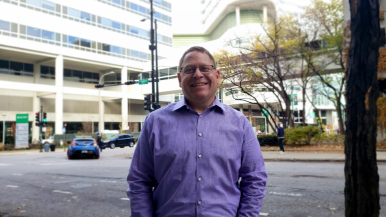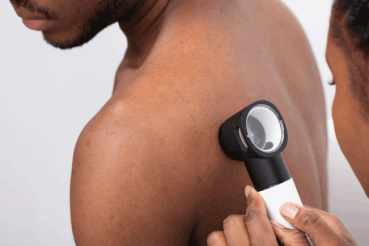When you fly, you definitely want your pilot to be healthy. That's why airline captain David Baron, 47, went to a doctor right away when he started having seemingly minor health issues almost 20 years ago.
“My symptoms first started with an unexplained sore throat that would come and go,” Baron says.
But what started as a sore throat quickly turned into a serious problem that threatened to not only ground Baron permanently, but end his life.
It was the first sign of a serious autoimmune disease called pemphigus vulgaris. Without proper treatment, it can be deadly in some cases.
Even with the right care, patients who go into remission can have dangerous flareups. That’s what eventually led Baron to Kyle Amber, MD, a dermatologist at RUSH.
Blisters all over the body
“Pemphigus vulgaris is an autoimmune blistering disease where the body attacks the mucosa and/or skin," Amber says. “It often presents as sores or blisters in the mouth. It can also progress rapidly, causing blisters all over the body.”
That’s what happened to Baron. Shortly after his symptoms first appeared, the sores and blisters covered his skin.
“At my worst, about 70% of my body was open erosions, which are almost like second- or third-degree type burns caused by the disease,” Baron says. “It’s basically like the skin just falls off.”
Over nine months, he saw seven different doctors who couldn’t correctly diagnose or treat him. They put him on antibiotics and removed his tonsils, but that didn’t stop his condition from worsening.
Even after he was correctly diagnosed, the usual treatments at the time, high-dose steroids, didn’t work because his pemphigus vulgaris was so severe. They also left him with side effects of insomnia and loss of bone mass.
‘Constant pain. Constant wound care.’
“I had to stop working,” Baron says. “I eventually needed full-time care and had to move back in with my parents for over a year. Constant pain. Constant wound care.”
Baron couldn’t find a physician who could properly treat him in the Chicago area where he lived, so his doctors needed to work with a specialist from a hospital on the East Coast.
The doctor prescribed infusions, or medications that are given through IVs. These infusions of rituximab and intravenous immunoglobulin were fairly new treatments for his disease at the time.
The treatment worked, and Baron went into remission for almost 13 years. But in 2019, his pemphigus vulgaris flared up, putting the life he built and his career at risk once again.
This time, though, he found a specialist much closer to home who could help him get his health back on track.
Back to remission
“I found Dr. Amber, who actually specializes in blistering skin diseases at RUSH,” Baron says.
Amber put Baron on rituximab and intravenous immunoglobulin infusions again, but he updated the treatment protocol. He listened to Baron’s needs and came up with a care plan that worked on his terms.
The FAA has certain requirements when it comes to medical treatment for airline captains. It was important that Baron meet those requirements and limit the amount of time he’d need away from work for treatment.
“Due to the challenges of my career, I’m limited on the treatments I can receive,” Baron says. “Dr. Amber was open to what I needed. And it felt like it was a collaborative, team effort in my treatment.”
Amber worked with Baron to get him into remission quickly and safely.
“It's important to me that pemphigus and its treatments don't limit patients’ ability to live their lives,” Amber says. “And that is a part of choosing the right treatment.”
“The big benefit was I didn’t have to do as many infusions at a time,” Baron says. “So I was able to cut down the number of days I spent getting infusions to get back to remission.”
Up in the air
Today, Baron is back to flying. In his free time, he trains his rat terrier for dog sports, agility and scent work.
“Our little terrier,” Baron says. “He has to stay busy, or else he gets bored.”
It seems, much like his pup, that Baron likes to stay busy too. He volunteers as an aeromedical subject matter expert with the Air Line Pilots Association, the largest airline pilot union in the world.
He’s also helping other patients like him find the treatment they need as a member of the board of directors for the International Pemphigus and Pemphigoid Foundation.
“Patient support is our number one focus,” Baron says. “We have peer health coaches who help other patients with support and guidance. We work with physicians — Dr. Amber is one of them — who provide medical information to our patients. And we have patients who speak at dental and medical schools, presenting our stories to help raise awareness.”
Baron also has some advice for those who might be going through their own challenges with pemphigus vulgaris or similar conditions.
“Number one is you need to be your own advocate," Baron says. “The medical system can be overwhelming, so you need to advocate for yourself. The second piece of advice is seek out the experts in your disease.”
Amber agrees with Baron’s advice. “Many dermatologists have little to no experience using rituximab or treating these conditions,” Amber says. “Patients are typically sent to infusion centers often run by oncologists or rheumatologists who do not have experience using this medication for these diseases. See someone with experience in your disease.”
If you need treatment for a skin condition, including pemphigus vulgaris, call RUSH Dermatology at (888) 352-7874. You can also learn more on our Dermatology Services page.




